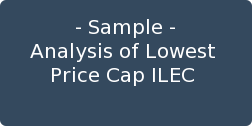 Switched Access filing season is upon us again. ILECs recently made their annual access filings with the FCC - to be effective on July 1, 2016. We've been watching the step down toward bill-and-keep for terminating end office switched access rates over the last several years as a result of the FCC's ICC Reform Order.
Switched Access filing season is upon us again. ILECs recently made their annual access filings with the FCC - to be effective on July 1, 2016. We've been watching the step down toward bill-and-keep for terminating end office switched access rates over the last several years as a result of the FCC's ICC Reform Order.
This year's Step 5 requires a reduction of interstate and intrastate terminating end office switched access rates to $0.0007 per minute for Price Cap Carriers and CLECs that benchmark to them. Rate of Return Carriers, and CLECs that benchmark to them, must reduce their interstate and intrastate terminating end office switched access rates to $0.005 per minute. There are multiple switched access rate elements, and it's important to understand what rate elements are considered end office rates. End office rates include the following, where applicable:
- Local Switching
- Common and Dedicated End Office Trunk Ports
- Carrier Common Line
- Information Surcharge
- Residual/Transport Interconnection Charge
- Information Surcharge
 We saw ILECs implement the step down to $0.0007 in a variety of ways beginning with Step 3 in July of 2014. Verizon condensed multiple elements into one rate called the "Composite Terminating End Office Charge", effectively a local switching charge. AT&T's approach was similar to Verizon, incorporating the Dedicated Trunk Port (DTP) and Common Trunk Port (CTP) into the local switching rate. CenturyLink (Qwest) began reducing only the terminating local switching rate, but then reduced other end office elements to reach the $0.0007 target. CenturyLink (Embarq) and Windstream reduced all end office elements.
We saw ILECs implement the step down to $0.0007 in a variety of ways beginning with Step 3 in July of 2014. Verizon condensed multiple elements into one rate called the "Composite Terminating End Office Charge", effectively a local switching charge. AT&T's approach was similar to Verizon, incorporating the Dedicated Trunk Port (DTP) and Common Trunk Port (CTP) into the local switching rate. CenturyLink (Qwest) began reducing only the terminating local switching rate, but then reduced other end office elements to reach the $0.0007 target. CenturyLink (Embarq) and Windstream reduced all end office elements.
While terminating end office rates will be $0.0007 per minute, a monthly DTP charge may also apply. We saw ILECs take different approaches regarding how this rate was reduced and applied going forward. AT&T and Frontier tariff an “originating” monthly rate, but the rate is billed as originating and terminating based on a Percent Originating Usage (POU) factor of 50%. CenturyLink calculated the DTP assuming a 50/50 split of the originating and terminating traffic. The terminating portion of the rate was reduced and then combined with the originating portion to create a single flat rate for billing purposes. Verizon added a footnote in their tariffs stating that the DTP will only apply to the portion associated with originating usage.
Keep in mind that transport rate elements (tandem switching, tandem switched transport - termination, tandem switched transport - facility, common mutliplexing, and dedicated tandem trunk port) are not affected yet. Next year with Step 6, terminating transport rates will be reduced to $0.0007 and terminating end office switched access rates will be reduced to bill-and-keep for Price Cap ILECs and CLECs that benchmark to them. However, the terminating transport reduction only applies when the terminating (end office) carrier or its affiliate owns the serving tandem switch. Therefore, transit traffic handled by intermediate carriers is not affected by the Reform Order.
 To complicate matters further, the Reform Order treats the two types of transport (Direct-Trunked and Tandem-Switched) differently. Direct-Trunked (dedicated circuits in which flat monthly charges apply) are not impacted by the Reform Order other than the requirement that intrastate direct-trunked transport charges equal the interstate charges. Switched access customers will continue to pay direct-trunked transport charges until the FCC addresses them in the future. Other items yet to be addressed by the FCC include originating access and ancillary rate elements, e.g. the 8YY Query.
To complicate matters further, the Reform Order treats the two types of transport (Direct-Trunked and Tandem-Switched) differently. Direct-Trunked (dedicated circuits in which flat monthly charges apply) are not impacted by the Reform Order other than the requirement that intrastate direct-trunked transport charges equal the interstate charges. Switched access customers will continue to pay direct-trunked transport charges until the FCC addresses them in the future. Other items yet to be addressed by the FCC include originating access and ancillary rate elements, e.g. the 8YY Query.
CLECs that benchmark to ILEC rates have 15 days from the effective date of the ILEC rates to file their rate reductions. Since July 16th falls on a Saturday this year and FCC filings are not accepted on weekends, CLEC filings must be made no later than Friday, July 15, 2016. CLECs can match each ILEC’s rates individually, or create a composite in states where they compete with multiple ILECs. The terminating end office rates CLECs file at the interstate level will also need to be filed at the intrastate level, unless the intrastate tariffs contain a reference back to the interstate tariff. There are still several states that require access rates to be tariffed in lieu of referencing FCC tariffs.
TMI has compiled a summary of the July 1 ILEC reductions. The summary is combined into a tool that also assists in identifying the lowest price cap ILEC rates that are the required cap for carriers that trip the access stimulation triggers. Please contact Karen Ritter at 407-740-3021 or kritter@tminc.com if you want more information about this tool.






